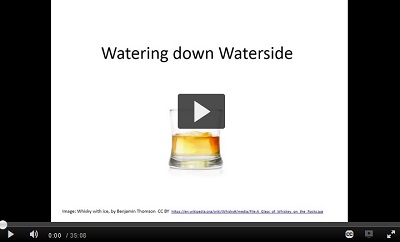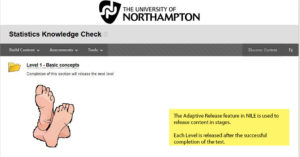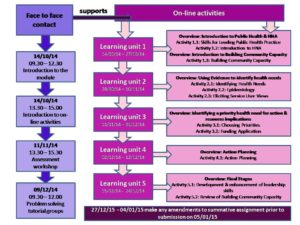The following presentation by Dr. Rachel Maunder entitled “Watering down Waterside” provides a summary of a similar presentation delivered at the School of Social Sciences Learning and Teaching event in February 2016.
Incorporating the Institute of Learning and Teaching’s (ILT) Direction of Travel video, the presentation provides advice and strategies for programme teams when thinking about the design of their modules and programmes for delivery now, and in preparation for Waterside, linking the use of NILE and the NILE benchmarks, describing blended learning and flipped learning approaches (with examples such as the module PSY1006 – Becoming a Psychologist), and introducing elements of the CAIeRO process.
At the recent Sharing Higher Education Design (S.H.E.D.) roadshow week in Science and Technology, the Learning Design team were introduced to a number of examples of good practice, including the hugely successful open educational resources (OERs) that have been published by staff in the School. These resources – some of which have had hits in the thousands – are publicly available, benefiting not just our students but learners around the world who are looking to further their understanding.
To find about more about these resources, visit the Learning and Teaching blog from the School.
Watch this space for more case studies from the S.H.E.D!
The Geography+ project aims to support the development of employability skills in students studying in levels 4 and 5 of the Geography programme. It is currently running as an extra-curricular ‘module’ led by Faith Tucker, with support from staff in the discipline and staff from the Changemaker hub.
For more detail about Geography+, have a look at the overview:
[Posted on behalf of Anne Misselbrook – Content Developer]
Dr Michael Curran PhD, MBA, MPhil is an Associate Professor (Podiatry) and module leader for research methods in Podiatry at the University of Northampton.
One of the research methods modules taught over three years of the BSc Hons Podiatry course is inferential statistics. Mike was keen to increase the blend of this material between face to face delivery and online activity, and this resulted in the Statistics Knowledge Check. He has completed the cycle of transferring content online and students provided feedback using a survey included in the Statistics Knowledge Check.
One of the Podiatry students noted:
“I found tackling the Knowledge Check in 4 separate stages hugely useful and much more manageable than being exposed to a larger test. I found the separate stages less intimidating”.
Dr Curran reflected on the experience:
“It is interesting to me how to blend the concept of e packages with actual face to face teaching. I guess it is the future.
On reflection I think we have hit the middle ground of evaluation with no very favourable student comment, but equally no very unfavourable comment. Considering this is teaching statistics that is probably pretty good!!
My reason for doing this is to try and look at alternative ways of delivering a potentially dry subject, with ability for the students to reflect on the statistics at a future date.
I would consider repeating this approach for other areas of my teaching”.
To read the full blog article please click here. Using an online Gamification approach to teaching inferential statistics
To find out how to use the Adaptive Release feature in NILE please click on the link here
Learn more from Blackboard Help click here
Dr. Stuart Allen recently redesigned his level seven epidemiology module in order to add some pre-class blended/distance learning elements into it.
You can find out what worked well (and what didn’t work so well) in this audio interview with Dr. Rachel Maxwell: http://www.kaltura.com/tiny/nrimm
Leading Public Health Practice (NURM009) includes learning and teaching activities that are predominantly facilitated via online learning. It was felt that a clear strategy was needed whereby students would be able to identify clearly how the activities and associated feedback can contribute to their summative assignment.
Students work sequentially through five learning units, each of which contains a brief overview of theoretical concepts and supported with structured on-line activities. Each learning unit concludes with a summary identifying how learning from each on-line activity can be utilised within their summative assignment.
For more information about this assessment, please contact Sue Everett, Senior Lecturer—Advanced Practitioner (Sue.Everett@northampton.ac.uk)
This case study is taken from the Institute of Learning and Teaching’s 2015 publication ‘Outside the Box Assessment and Feedback Practices’, available from the University’s Assessment and Feedback portal.
Within the School of Health we have a fundamental role in preparing and supporting people to work with the public, patients, carers and service users. We feel it is only right that these people should be involved in as many aspects of this as possible. We believe patients/service users and carers should be part of providing feedback on health and social care undergraduate students’ values and behaviours.
This is reinforced by the UK Government, who promote the idea that patients should contribute to the assessment of pre-registration student nurses. The Nursing and Midwifery Council promotes the idea that patients should contribute to the assessment of preregistration student nurses. With a strong emphasis currently on nursing becoming a more compassionate profession, the Francis report (2013) has highlighted a need to recruit, educate and assess nursing students with regard to their attitude, values, and beliefs in relation to providing care.
Who better to ask than the patients/service users and carers?
The following process was piloted and then implemented within all undergraduate nursing, midwifery and podiatry students from March 2014.
- Undergraduate students are introduced to service user and carer involvement and the role of the service user/carer in student assessment in first module of their education programme.
- Service user and carer feedback tools are available and are given to the Mentor by the student on placement.
- The Mentor/Assessor follows a four step process.
- Students’ practice learning documents have specific area for discussion with Mentor and recording Service user/carer feedback.
An e-learning activity was developed to support Mentors in this process. This is now an Open Education Resource available from http://find.jorum.ac.uk/resources/18963. Patient information posters were made available in practice areas and on digital display within patient areas in hospitals.
For more information about this assessment, please contact Linda Lilley, Senior Lecturer in Practice Development (Linda.Lilley@northampton.ac.uk)
This case study is taken from the Institute of Learning and Teaching’s 2015 publication ‘Outside the Box Assessment and Feedback Practices’, available from the University’s Assessment and Feedback portal.
We use ‘concept maps’ as an assessment tool within the Volunteering module (SWK1003). Students visualise the sub-concepts that make up a main concept. They can draw this out using whatever form or tool they want. It requires minimal grammatical competence but needs to show good conceptual understanding. The results were outstanding.
For more information about this assessment, please contact Mark Allenby, Senior Lecturer in Social Work (Mark.Allenby@northampton.ac.uk) or Victoria Boulton, Teaching Research Assistant (Victoria.Boulton@northampton.ac.uk).
This case study is taken from the Institute of Learning and Teaching’s 2015 publication ‘Outside the Box Assessment and Feedback Practices’, available from the University’s Assessment and Feedback portal.
 Having redesigned her Leading Public Health Practice module from being fully face-to-face, to blended, Sue Everett in the School of Health, reflects on the skills she developed in the process and how she has moved from being a ‘technophobe’ to the ‘go to’ girl for technology in her office!
Having redesigned her Leading Public Health Practice module from being fully face-to-face, to blended, Sue Everett in the School of Health, reflects on the skills she developed in the process and how she has moved from being a ‘technophobe’ to the ‘go to’ girl for technology in her office!
If you have any questions about CAIeRO, or would like to book one for your module team, please email LD@northampton.ac.uk. If you would like to talk further to Sue about her experiences, she is happy for you to contact her.
 In March/April 2014, Sue Everett, Kirsty Mason and Stuart Allen in the School of Helath underwent a CAIeRO on their three modules for the PGC in Public Health. Initially redesigned for fully online learning, the Programme was slightly altered to reintroduce some face-to-face sessions, resulting in a ‘Waterside-ready’, set of blended learning modules.
In March/April 2014, Sue Everett, Kirsty Mason and Stuart Allen in the School of Helath underwent a CAIeRO on their three modules for the PGC in Public Health. Initially redesigned for fully online learning, the Programme was slightly altered to reintroduce some face-to-face sessions, resulting in a ‘Waterside-ready’, set of blended learning modules.
Having run her module in the new design, Sue shares some of her reflections on the process and her learning experiences in this video.
If you have any questions about CAIeRO, or would like to book one for your module team, please email LD@northampton.ac.uk. If you would like to talk further to Sue about her experiences, she is happy for you to contact her.
Recent Posts
- Blackboard Upgrade – January 2026
- Spotlight on Excellence: Bringing AI Conversations into Management Learning
- Blackboard Upgrade – December 2025
- Preparing for your Physiotherapy Apprenticeship Programme (PREP-PAP) by Fiona Barrett and Anna Smith
- Blackboard Upgrade – November 2025
- Fix Your Content Day 2025
- Blackboard Upgrade – October 2025
- Blackboard Upgrade – September 2025
- The potential student benefits of staying engaged with learning and teaching material
- LearnTech Symposium 2025
Tags
ABL Practitioner Stories Academic Skills Accessibility Active Blended Learning (ABL) ADE AI Artificial Intelligence Assessment Design Assessment Tools Blackboard Blackboard Learn Blackboard Upgrade Blended Learning Blogs CAIeRO Collaborate Collaboration Distance Learning Feedback FHES Flipped Learning iNorthampton iPad Kaltura Learner Experience MALT Mobile Newsletter NILE NILE Ultra Outside the box Panopto Presentations Quality Reflection SHED Submitting and Grading Electronically (SaGE) Turnitin Ultra Ultra Upgrade Update Updates Video Waterside XerteArchives
Site Admin






